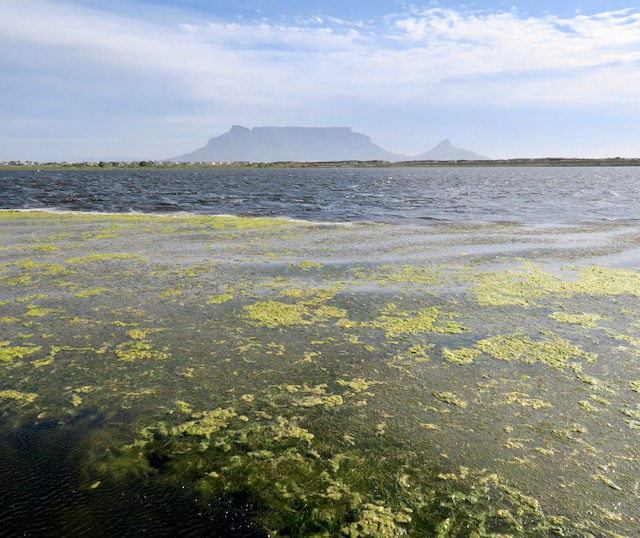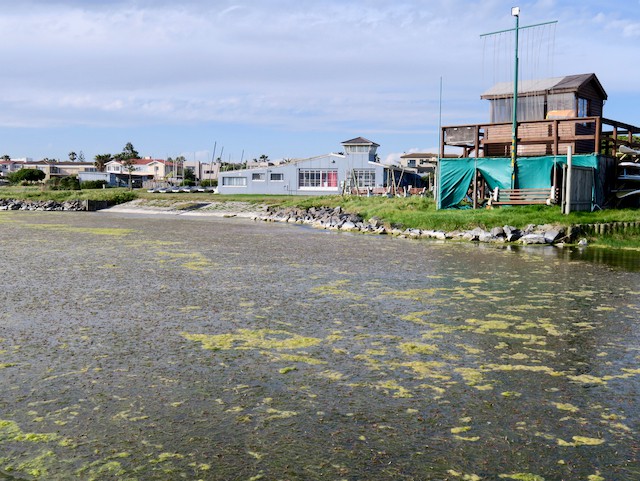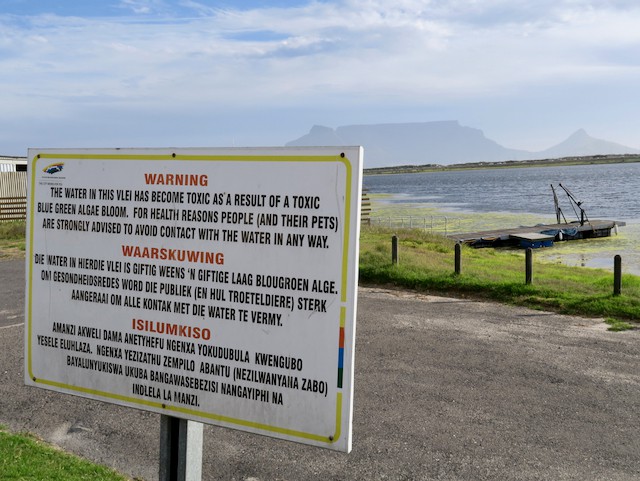Cape Town’s polluted vleis costing jobs
Sewage spills are damaging local businesses and international tourism
Blue-green algae blooming in Rietvlei. The algae, fed by nutrients in sewage, produces a toxin and reduces oxygen levels in the water, which can lead to fish die-offs. Photos: Steve Kretzmann
- Closures of Rietvlei, Zandvlei, and Zeekoevlei in Cape Town due to sewage spilling into the water bodies has hit water sports businesses, clubs and tourism.
- Business and club owners say they are retrenching staff and losing significant turnover.
- An aquatic club conservation officer says the City hasn’t done enough to identify the sources of pollution and to stop it.
- The City of Cape Town blames the public for abusing the sewage system and causing blockages.
Failure by the City of Cape Town to keep sewage from flowing into its nature reserves is resulting in job losses and lost business.
Cape Town’s three most popular inland water bodies – Rietvlei, Zandvlei and Zeekoevlei – are all within nature reserves managed by the City. They have all been closed for months due to ongoing pollution from sewage. This has had a major impact on water sports businesses, sports clubs and tourism.
The first to be closed this year was Zandvlei in Muizenberg on 25 May. It was partially opened again on 11 October but closed 11 days later due to unacceptably high bacterial counts caused by sewage. Rietvlei in Milnerton was closed on 24 June. Zeekoevlei, next to Grassy Park, was closed on 15 July.
Rietvlei in particular is an international destination for windsurfers and also for wing foiling, the sport’s popular new offshoot.
“Between 200 and 300 people from all over the world come to train at Rietvlei,” says Milnerton Aquatic Club commodore Brian Weber. They come from northern hemisphere countries to be able to train during our summer, says Weber. But with the vlei closed, they are either cancelling their plans or holding back to see if the pollution is cleaned up.
With neither international visitors nor locals able to go out on the water, the club, situated on the banks of Rietvlei, has no one ordering food from the restaurant or having a drink at the bar. As a result, Weber had to retrench four of the restaurant and bar staff.
The bosun, who provides sailing lessons at the club, is leaving at the end of October, says Weber, and the cleaner and the gardener, who used to work every day, now work only twice a week. A crew of six men from Dunoon, whom the club together with local businesses used to employ to clear the water weeds from the bank, also no longer have an income.
Weber said the club was losing money from the empty restaurant and bar, with members enquiring whether they should still be having to pay their club fees. He is preparing for the worst: the vlei remaining closed during the summer months, which is peak season.
A global attraction
“Rietvlei is one of the top five wing foil and windsurfing destinations in the world,” says attorney Shayne Krige, who assisted Friends of Rietvlei in appealing to the City and the provincial Environmental Management Inspectorate, the Green Scorpions.
Reliable wind, moderate water temperature, a safe environment and proximity to Cape Town make it attractive for beginners, as well as for professionals who come to train for speed and to test their equipment.
Professionals are also attracted by the proximity of the ocean where they can test their skills.
But an email to the Milnerton Aquatic Club by a Blouberg guesthouse owner reveals that she had queries from Olympic windsurfers who wanted to come and train, but had heard about the closure of the vlei. The closure of the vlei has already cost her three bookings on the back of “the whole disaster last year”.
Numerous water sports business owners situated in Milnerton and surrounds said the loss of hundreds of tourists, many of whom stayed for up to three months, also meant a loss of business for restaurants, grocery stores and other services.
The Milnerton Aquatic Club is a meeting place for Cape Town water sports enthusiasts and their families, but closure of the vlei due to ongoing sewage pollution has left it almost deserted.
Businesses losing money
Simon Duffet, owner of The Brand Stable, said he had “zero sales” of windsurfing and wind foil equipment since the closure of the vlei, resulting in a 50% drop in his gross turnover.
Cameron Rein, who owns Watersports Warehouse, says he would usually sell about 12 wing foil rigs a month to new customers taking up the sport. But with nowhere for beginners to learn, he estimates he’s losing about R600,000 a month while Rietvlei is closed. Rein says that’s without taking into account the lessons he would provide.
Wilfred Christl’s entire business is based on wing foil lessons, and operates from the Milnerton Aquatic Club. Christl says the closure of the vlei has led to an 80% decrease in his business, and if he wasn’t drawing a pension, he wouldn’t be able to survive.
He now offers lessons at Langebaan and Theewaterskloof, but this involves additional costs of fuel, entrance fees, launching fees for his boat, and accommodation if a group is staying over.
“Now I’m like a gypsy,” he says. He adds that he’d just dealt with ten emails from potential clients from Europe, asking about pollution of the vlei. “It’s like a bush telegraph” among the international water sports community.
Board repair businesses such as Angus Welch’s are also affected. With no one out on the water and no learners, fewer boards are damaged, says Welch. He says he still repairs boards brought in by advanced riders who go out in the surf, but the closure of the vlei means “the base of the pyramid has been kicked out” as no new enthusiasts are able to join the community.
He also bemoans the loss of the vlei as a meeting place. “It’s where we network, meet, chat, and it’s safe for the kids.” But now “youngsters have nowhere to play and learn,” he says.
Efforts to hold authorities accountable
Milnerton Aquatic Club conservation officer Katja Haslinger says she’s approached the Organisation Undoing Tax Abuse (OUTA), who successfully lobbied for the Green Scorpions to issue a directive to the City to develop a plan to clean up the chronic pollution of the Milnerton Lagoon.
The City’s compliance report is yet to be provided.
Haslinger said she also approached the Green Scorpions regarding Rietvlei in July, and they conducted a site visit on 22 September, but no pre-directive to the City has yet been issued for that vlei.
She said Rietvlei was fed by stormwater from Parklands, Table View, and Blouberg, and the pollution points had been identified. Milnerton Aquatic Club has been conducting independent water quality tests at known pollution points, such as the stormwater outlet from Blaauwberg Road east.
Samples taken on 6 October showed extremely high E. coli levels.
She said she’d asked the City for the latest water quality results, but they were “holding it back”, although she says she usually receives them.
She says the City hasn’t done enough to identify the sources of pollution.
“The City blames the pollution on the abuse of the sewerage system, but the City needs to maintain and do proper clean ups. The problem in general seems to be a failing sewerage system. There are broken pipes just adjacent to the reserve, there’s always sewage coming out and they have to fix it,” said Haslinger.
She said developments in Parklands and Sunningdale were going ahead without infrastructure being upgraded to deal with the increased sewage load. Pump stations were failing and had no backup power if the power tripped.
Additionally, she said, no rehabilitation plan for the nature reserve has been provided.
A sign at Rietvlei erected by the City to warn people not to make contact with the water.
City response
City biodiversity management manager Julia Wood said pollution in the nature reserves was a concern and remedial activities such as weed harvesting and dredging was planned for all the vleis “in order to mitigate pollution events”.
Mayco Member for Water and Waste Xanthea Limberg said, “A number of the recent sewer spillages into both Zeekoevlei and Rietvlei are a direct result of illegal dumping of material into manholes as well as rags and other foreign objects flushed into the sewer system leading to pump failure.”
She said the incidence of manhole cover theft in recent months was “unprecedented”, and that the volume and size of objects having to be pulled out of the sewer line meant teams on the ground were under “immense pressure”.
She said the City is running a “bin it, don’t block it campaign” to raise awareness on how to prevent sewer blockages and overflows.
Limberg provided the latest water quality test results. Samples taken on 15 October recorded that the mouth of stormwater outlet draining to Rietvlei had an E. coli count of 1,100,000 cfu/100ml, with over 1,000,000 cfu/100ml in the detention canal between the outlet and the vlei itself. Within the vlei, results ranged from 1,700cfu/100ml to 4,600cfu/100ml.
The City considers measurements of more than 4,001 cfu/100ml to pose an “unacceptable risk” to public health.
Limberg said the decision on whether to open the vlei for recreational use lay with the City health department.
Support independent journalism
Donate using Payfast

Don't miss out on the latest news
We respect your privacy, and promise we won't spam you.
Next: Immigrant children use art to show how prejudice hurts
Previous: Fishers march against lobster quota
© 2021 GroundUp. This article is licensed under a Creative Commons Attribution-NoDerivatives 4.0 International License.
You may republish this article, so long as you credit the authors and GroundUp, and do not change the text. Please include a link back to the original article.
We put an invisible pixel in the article so that we can count traffic to republishers. All analytics tools are solely on our servers. We do not give our logs to any third party. Logs are deleted after two weeks. We do not use any IP address identifying information except to count regional traffic. We are solely interested in counting hits, not tracking users. If you republish, please do not delete the invisible pixel.



